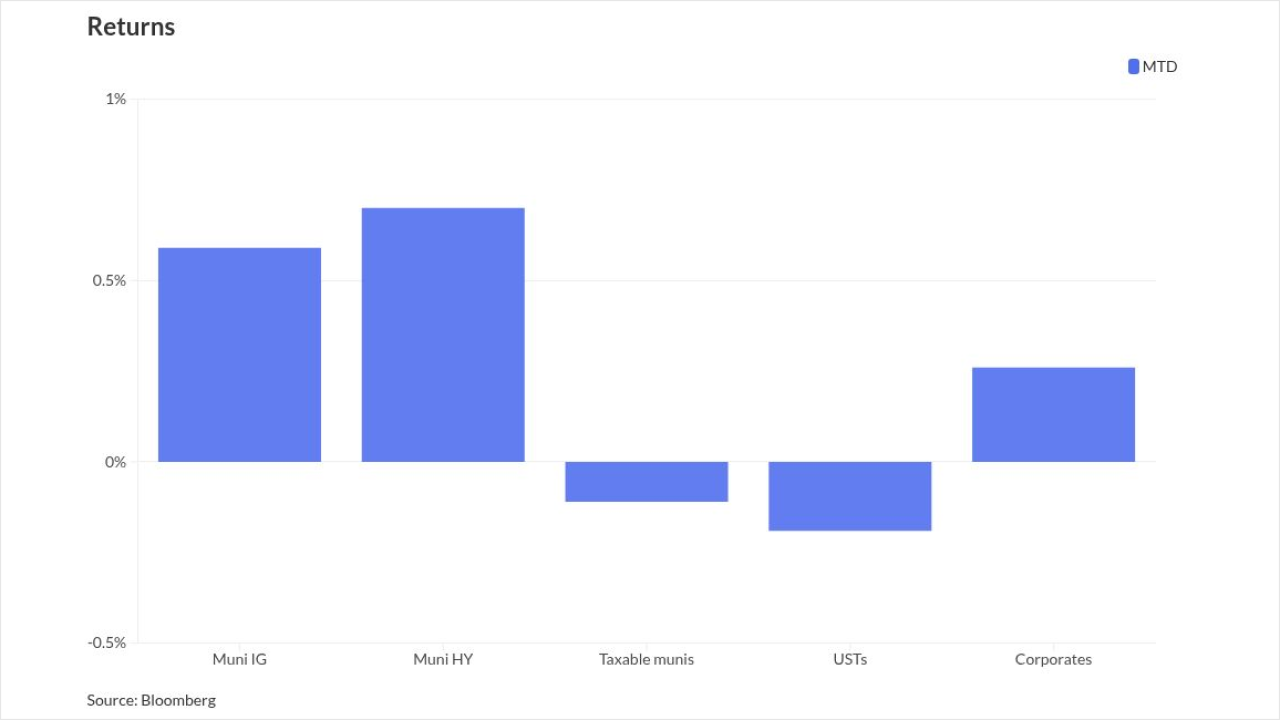Current problems in the credit markets are now undercutting the short-term municipal market, as rising yields in variable-rate demand notes and auction rates and a handful of failed auctions show a market reeling from credit concerns and no longer protected by staunch triple-A rated bond insurance.
On the variable-rate demand side, observers say the problem begins with the conservative rating scale used by munis. Compared to the corporate scale, the municipal market has far fewer natural double- or triple-A rated issuers, despite the fact that munis have historic default rates far below those of corporate bonds.
This would not be a problem, except that a large sector of institutional buyers in the market for short-term paper are money market funds. Because of the safe and liquid investment these funds are meant to provide, the Securities and Exchange Commission requires, through rule 2a-7, that they cannot hold securities rated below double-A. The same is true of money market funds that invest in corporate bonds.
"What the real issue is that an A-plus muni, particularly a GO or central service bond, if you rated it on the corporate scale it could be double-A or a triple-A," said Mary Jo Ochson, senior vice president and chief investment officer for the tax-exempt money market and municipal bond investment groups at Federated Investments. "That is the problem that people are having. They have to put back a security that if rated on the corporate scale would be like the top quality stuff in a fund. So how do you reconcile that?"
For many years, bond insurance has played a key role in this arena by lending its triple-A rating to these lower-rated, but historically safe securities. By raising many securities to triple-As, bond insurance allowed a whole class of bonds to become available as collateral for tender option bond trusts, which in turn sold short-term, high-rated variable-rate debt to money market funds.
The TOBs' appetite for the insured bonds drove yields down and narrowed the spreads for long-dated municipal bonds. The money market funds, with billions of dollars in ready cash looking for safe investments, snapped up the floaters issued by the trusts.
The bond insurers were needed to get sufficient triple-A debt for the programs, said Matt Fabian, managing director at Municipal Market Advisors. "It doesn't matter if anybody believes in those ratings, we just need them to satisfy the structural requirements," he said. "Because the underlying credit is money market quality."
But if the rating agencies go ahead with the bond insurer downgrades below the 2a-7 threshold as the pending rating actions indicate they could, it will mean that far fewer bonds will be bought by the TOB programs to create securities for those funds. Fitch Ratings has already taken one, XL Capital Assurance Inc., to A, well below the money market funds' requirement.
The precise problems now being seen in the short-term market relate to the liquidity function of the securities held by the money market funds. The dealers that sold the variable-rate demand obligations and the tender option bond floaters to the funds in the first place - which provide a put or tender option if the investors want to sell the bonds back - can walk away if the bonds fall below the double-A rating. SEC rules say the lack of a liquidity function, in the event that it disappears, would force the money funds to sell the bonds.
"It's just structural, we're banking on the risk perception of the liquidity providers," Fabian said. "To be conservative we need to address the risks that liquidity providers are going to walk away."
It is those risks that have led funds to begin selling the short-term securities back to the dealers. As demand for the securities has fallen, based mainly on investors unwillingness to take on the risk of particular insurers, yields on variable rate demand notes have increased.
Yields have also increased in the auction rate market as well, reflecting a similar lack of demand and liquidity. Not only have yields risen, but in some half-dozen cases or more, auctions have actually failed.
"When an auction fails there were insufficient bids to set a rate," said Joseph Fichera, chief executive officer with Saber Partners, LLC.
Fichera said a Georgetown University auction recently failed, and reports have surfaced that a public power issuer in Nevada also had a failed auction.
In the past if bids were insufficient to clear the bonds, banks - the liquidity providers - would often buy the bonds to save the auction. But now, as muni departments get squeezed by bank's subprime losses and capital allocations move away from public finance, the banks are less willing to save the auction, Fichera said.
"Dealers that backstop an auction do it at their own risk, but now we find out it is not happening," he said.
As the yields have begun to rise for variable-rate securities, it has made it harder and harder for TOB trusts to make the finances work. In some cases, trusts have been unwound to pay for the variable rate floaters being sold back, while for others it has simply narrowed the spread on the carry trade, where TOB programs make their money.
"There will be a lot of TOBs that will have to unwind their positions because if the weekly floating-rate tranche that the money market funds buy is no longer 2a-7 eligible they will not want it and will not buy it," said Paul Brennan, portfolio manager at Nuveen Investments Inc. "Therefore the funding costs rise for the trusts and the economics aren't attractive anymore."
As TOBs collapse, or if new ones aren't created because of a general lack of interest, the borrowing costs for municipal issuers will increase.
"TOBs alone were driving the long end of the market in terms of the tightness of the spreads," said Robert Smith, president and chief investment officer at Sage Advisory Services. "For every action there is a reaction."
Some TOB programs have taken proactive steps to ensure that the liquidity function is preserved, and to reassure the money market funds that are their clients. Some measures include changing the language of the agreement to define termination events, adding insurance on top of insurance, or providing broker-dealer or bank credit enhancement wraps to support the bonds.
"On the synthetic side, if you have a double-A issuer and an A insurer, you still have that double-A entity as long as the put documents are correctly written to encompass both," Federated's Ochson said. "On the synthetic side everyone is doing a good job getting those documents amended. Obviously, we've spent a lot of time on that, so I think the progress has been pretty good consisdering the volume of deals."
The intricacies of the market became further apparent last week, when Fitchamended its new policy regarding the ratings for bonds wrapped by downgraded bond insurers. Fitch said in its amendment that the policy would not apply in those cases where the insured rating is required to keep tender-option bond programs or variable-rate demand obligations intact.
"We had calls from some participants in the short-term variable rate market who were concerned that this policy might affect the ratings on those [tender option bond programs] and [variable rate demand obligations]," said Fitch managing director David Litvack. "It had never been our intention to withdraw those ratings where the ratings were relied upon to maintain the integrity of the structure."
Fitch earlier had said it would withdraw its rating in cases where Fitch does not assign an underlying rating and the insurer is downgraded below an underlying rating assigned by Moody's Investors Service or Standard & Poor's. Litvack said at the time of the initial policy change it had become apparent that in some cases the insured rating was too low to appropriately reflect the issuer's credit rating.
In addition to XL, Fitch has downgraded Ambac Assurance Corp., and Financial Guaranty Insurance Co. to AA. All three financial guarantors, along with triple-A rated MBIA Insurance Corp. and CIFG Assurance remain on negative watch. q





